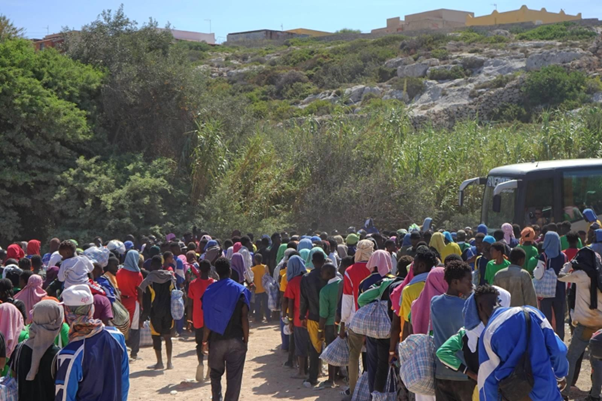Sep 19, 2023
Arrivals in Lampedusa – Solidarity and resistance in the face of Europe’s reception crisis
Collective action: Joint statement by 82 organizations
Following the arrival of a record number of people on the move in Lampedusa, civil society expresses its deep concern at the security response of European states, the crisis of reception, and reaffirms its solidarity with people on the move arriving in Europe.
More than 5,000 people and 112 boats: this is the number of arrivals recorded on the Italian island of Lampedusa on Tuesday September 12. The boats, most of which arrived autonomously, originated in Tunisia or Libya. In total, more than 118,500 people have reached the Italian coast since the start of the year, almost double the 64,529 recorded during the same period in 2022 [1]. The accumulation of numbers does not make us forget that, behind each number, there is a human being, an individual story and that people still lose their life trying to reach Europe.
While Lampedusa has long been a destination for the boats of hundreds of people seeking refuge in Europe, the island’s reception facilities are lacking. On Tuesday, the chaotic rescue of a boat caused the death of a 5-month-old baby, who fell into the water and immediately drowned, while dozens of boats continued to dock in the commercial port. For several hours, hundreds of people remained stranded on the pier, without water or food, before being transferred to the Lampedusa hotspot.
The hotspot, a triage center where those who just arrived are kept away from the local population and pre-identified before being transferred to the mainland, with its 389 places, has no capacity whatsoever to welcome with dignity the people arriving on the island on a daily basis. Since Tuesday, the center’s staff have been completely overwhelmed by the presence of 6,000 people. The Red Cross and staff from other organizations have been prevented from entering the facility for “safety reasons”.
On Thursday morning, many people began to escape from the hotspot by jumping the fences due to the inhumane situation that was being experienced. Meanwhile, in the face of the Italian authorities’ failure to provide a dignified welcome, local solidarity has taken over. Many locals have mobilized to organize food distributions for those who have taken refuge in the town [2].
In addition, different organizations are also denouncing the political crisis in Tunisia as well as the humanitarian emergency in the city of Sfax, from where most of the boats leave for Italy. Right now about 500 people sleep in Beb Jebli Square, with hardly any access to food or medical assistance [3]. Most have been forced to flee Sudan, Ethiopia, Somalia, Chad, Eritrea or Niger. Since the racist statements of Tunisia’s president, Kais Saied, many migrants have been expelled from their homes and jobs [4]. Others have been deported to the desert where some have died of thirst.
While these mass deportations are ongoing and the situation in Sfax continues to deteriorate, the EU agreed to a new migration deal with the Tunisian government three months ago in order to cooperate “more effectively on migration”, border management and “anti-smuggling” measures, with an envelope of over 100 million euros. The EU agreed to this new deal in full knowledge of the atrocities that the Tunisian government has carried out, including the attacks perpetrated by the Tunisian coast guards on migrant boats [5].
Meanwhile, we observe with concern how the different European governments are closing their doors and failing to comply with asylum laws and the most basic human rights. While the French Interior Minister has announced his intention to strengthen controls at the Italian border, several other EU Member States also declared that they would close their doors. In August, the German authorities decided to stop the selection processes for asylum seekers arriving in Germany from Italy under the ’voluntary solidarity mechanism’ [6].
Invited to Lampedusa on Sunday by the prime minister Meloni, European Commission President Von der Leyen announced a 10-point action plan that confirms this securitarian response [7]. Reinforcing controls at sea to the detriment of the obligation to rescue, increasing the pace of expulsions and stepping up the process of outsourcing borders… all old recipes that the European Union has been implementing for decades and which have proved their failure, only aggravating the crisis of solidarity and the situation of people on the move.The undersigned organizations call for an open and welcoming Europe and urge the EU Member states to provide safe and legal pathways and dignified reception conditions. We demand that urgent action be taken in Lampedusa and that international laws that protect the right to asylum be complied with. We are devastated by the continuous deaths at sea caused by the EU border policies and reaffirm our solidarity with people on the move.
For the list of signatories, see the attached document.
Lampedusa, picture taken in front of the hotspot, September 14, 2023. Credit: Maldusa
